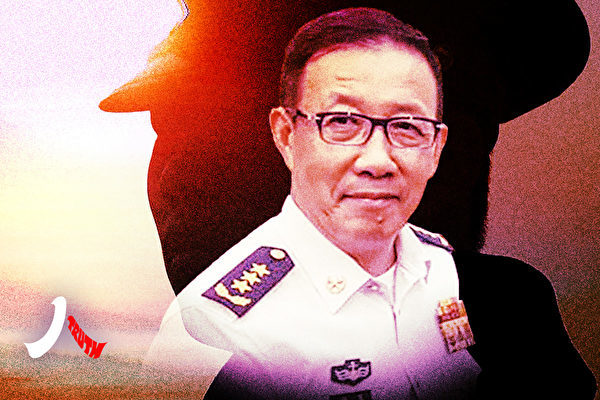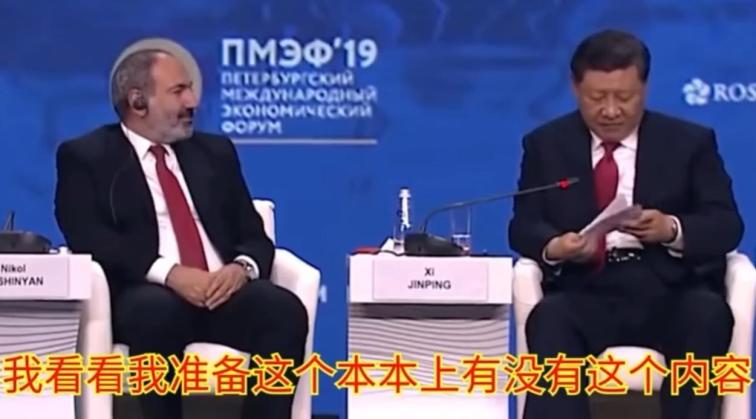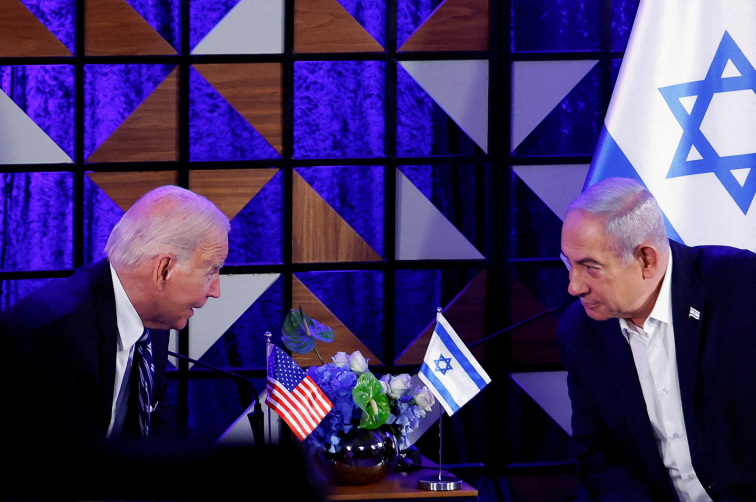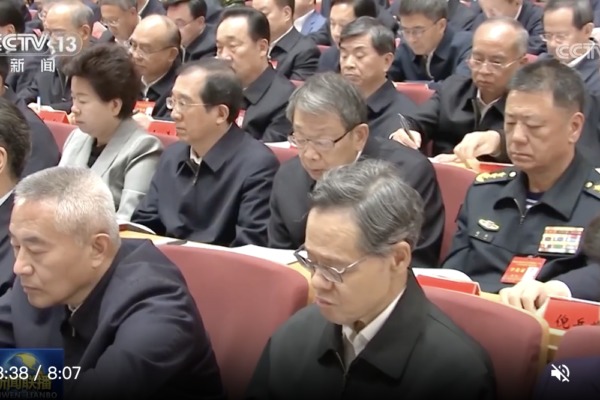Caption: Rumors from Beijing suggest plans to bring down the "New Gang of Four." (Illustration by People News)
People News - With Xi Jinping’s close ally, the Director of the Political Work Department of the Central Military Commission (CMC), Miao Hua, officially announced to be under investigation, and suspicions that Wang Chunning, the commander of the People’s Armed Police, has already fallen due to his absence from a public security meeting, signs of Xi losing control over military and party power are becoming increasingly evident. Since the CCP’s Third Plenary Session in July, various anomalies within the CCP's upper echelons have been interpreted as indications of Xi's declining authority. This perception has gained wider acceptance, and CCP officials, who are adept at sensing shifts in political winds, are now making their own calculations.
According to a report by Xinhua News Agency, the 2024 Seminar on In-depth Study and Implementation of Xi Jinping's Thought on Ecological Civilization was held in Beijing on November 29. Two anomalies stood out: first, the seminar was hosted by the Ministry of Ecology and Environment; second, during speeches by Minister Sun Jinlong and other senior officials, they emphasized implementing the spirit of the CCP’s 20th Third Plenary Session without mentioning phrases like "guided by Xi Jinping's Thought on Ecological Civilization."
The Research Center for Xi Jinping's Thought on Ecological Civilization was established in July 2021, "with the approval of the Central Committee," under the Ministry of Ecology and Environment. Its launch in Beijing was accompanied by a grand ceremony, attended by the Deputy Minister of the Central Propaganda Department, who lavished praise on Xi’s ecological thought, calling the center’s creation a "major strategic initiative aimed at promoting in-depth study and implementation of Xi Jinping's Thought on Ecological Civilization across the Party and society." The center was thus positioned as highly significant.
In the past, the center actively organized related seminars. For example, the "2021 Seminar on In-depth Study and Implementation of Xi Jinping's Thought on Ecological Civilization" in Chengdu; the 2022 online seminar; and the 2023 seminar in Changsha, Hunan, were all either hosted or co-hosted by this center. However, this year, the center was conspicuously absent from any reports on the event. What does this signal? Have Ministry of Ecology and Environment officials been given orders, or have they sensed something unusual?
Additionally, Sun Jinlong, the head of the Ministry of Ecology and Environment, referenced the Third Plenary Session’s recently adopted "Decision" during this year’s seminar, stating the need for further implementation. This stands in stark contrast to his statements in previous years. In 2023, Sun emphasized "adhering to the guidance of Xi Jinping's Thought on Ecological Civilization." In 2022, he declared that "under the scientific guidance of Xi Jinping's Thought on Ecological Civilization, we must deeply understand the profound humanistic, cultural, ecological, national, and global sentiments embedded in this thought."
In 2021, Sun’s speech was full of sycophantic rhetoric, such as: "The root lies in the strong leadership of the Party Central Committee with Comrade Xi Jinping at its core," and "the scientific guidance of Xi Jinping's Thought on Ecological Civilization." He went on to praise it as "a landmark, innovative, and strategic theoretical achievement."
Given that any anomaly within the CCP usually has underlying causes, the changes in the seminar's host and the altered rhetoric of senior officials suggest a possible shift in Xi’s authority. Could this indicate that officials who once vociferously praised Xi are now cautiously recalibrating their stance? Could it also signify that institutions established to glorify Xi’s various ideologies are beginning to lose their prominence?
According to data released by the CCP in 2021, since the 19th Party Congress in October 2017, numerous research centers dedicated to Xi Jinping’s various ideologies have been established. The most recent addition was the Research Center for Xi Jinping's Economic Thought, set up by the National Development and Reform Commission, bringing the total number of such institutions in China to 18. These include centers established at the Central Party School, the Ministry of Education, the Chinese Academy of Social Sciences, the Ministry of Ecology and Environment, the China Law Society, the National Defense University, and in Beijing, Shanghai, Guangdong, and prestigious universities like Peking University, Tsinghua University, and Renmin University of China.
Among these, Peking University houses four Xi Jinping Thought research centers, focusing on Xi’s economic thought, legal thought, diplomatic thought, and ecological civilization thought. According to the CCP’s Peking University Party Secretary, the university aims to build itself into an "academic stronghold" for interpreting "Xi Thought." Subsequently, Renmin University, Peking University, and Tsinghua University upgraded their "centers" to "institutes."
The question is: What is there to study about Xi Jinping's hodgepodge of incoherent "thoughts"? Countless universities and intellectuals flock to extract so-called "essence" from these unclear ideas and heap praise upon them. Such universities and intellectuals are destined to become historical laughingstocks once this chapter of history is over.
Similarly, after Selected Works of Mao Zedong, Selected Works of Deng Xiaoping, and Selected Works of Jiang Zemin became obsolete, Xi Jinping's The Governance of China—with over 13 million copies distributed worldwide, the highest number for any CCP leader’s works during the reform and opening-up period—will also be discarded into the trash. The "thoughts" and "theories" of CCP leaders are nothing more than pretentious rhetoric. They say one thing and do another, and the people have long seen through this façade.
In the 1980s, Xi Jinping's father, Xi Zhongxun, gave a speech where he said: "Two paths lie before us. One is the path of rule of law. The rule of law is the best way for modern governments to manage society and is our best choice to overcome difficulties and move toward tomorrow. The other is to return to and continue down the old road of an 'omnipotent government,' or 'rule by man,' relying on a great leader to issue commands, using planned economies or even monopolies to address the layers of exploitation in the economic sector, relying on studying the leader’s speeches, ideological work, and moral education to tackle corruption and abuse of power, and using stricter discipline to resolve ideological, theoretical, and cultural issues. If we continue down this road, even if Comrade Xiaoping lives to be 100 years old, he won’t be able to resolve the transformation of our system." This speech was published in Qiushi Theory Online in 2014.
In Xi Zhongxun’s view, relying on one person to issue commands, "relying on studying the leader’s speeches, ideological work, and moral education to tackle corruption and abuse of power, and using stricter discipline to resolve ideological, theoretical, and cultural issues," is clearly the wrong path and unlikely to achieve much. Xi Zhongxun essentially declared his son’s governance model a dead end long before it came into existence. Those universities and intellectuals who blindly follow the political trends of the era are also bound to bear the consequences of their actions.
(First published by People News)











News magazine bootstrap themes!
I like this themes, fast loading and look profesional
Thank you Carlos!
You're welcome!
Please support me with give positive rating!
Yes Sure!